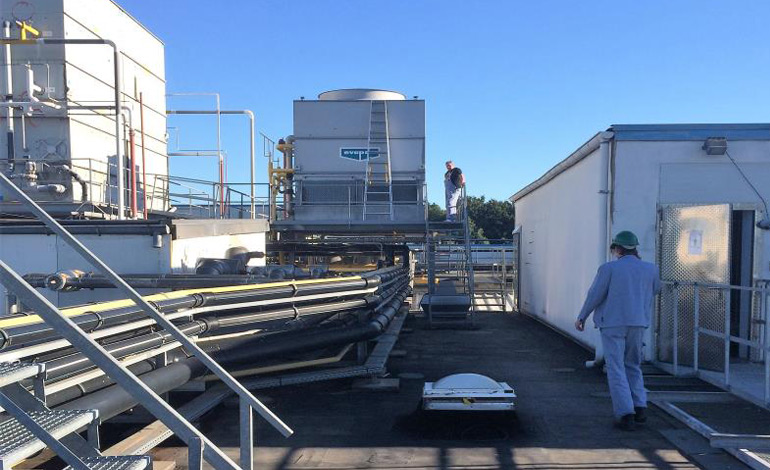Evaporation condensers
Ensuring hygienic operations for evaporative cooling systems according to the VDI guideline 2047, sheet 2

The Task
Cooling towers are used where cooling water is required for process and machine cooling. Refrigeration systems tend to be used for cooling water temperatures below around +20°C, while cooling towers are used for higher temperatures.
The water to be cooled is sprayed using a water distribution system and percolated via fillers, whose shape provides for a long retention time for the water. Ambient air is introduced in a counterflow, causing a small part of the water to evaporate. The recooled water is collected in the floor tub and fed back into the cooling systems.
Risk
Due in part to their temperature range, a strong reproduction of legionella bacteria can occur in evaporative cooling systems if conditions are unfavourable. This may lead to water droplets (aerosols) being emitted, which may - when inhaled by human beings - cause severe pneumonia that may even result in death.
Legionella are water bacteria that occur in all bodies of freshwater. Water temperatures between 25°C and 45°C may favour enormous reproduction rates leading to significant health hazards. Risks can arise for both staff members working in the environment of aerosol generating units and for completely unrelated individuals, if aerosols are carried in the air.
This is why all water bearing systems must reliably comply with hygiene requirements to prevent health hazards.
The challenge
- Compliance with the parameters of the 42nd Federal Emission Control Act BImSchV (as of November 2016) and VDI 2047-2
- Risk assessment for cooling systems
- Hygienic operations of cooling systems and their maintenance measures
- Highest possible degree of water utilisation in order to optimise operating costs
- Preventing incrustations and corrosion in system components with water contact
- Preventing legionella bacteria and the formation of biofilms on cooling tower fittings, in particular during the summer months
- Optimised heat transfer using deposit-free heat exchangers
The solution
- Creating operating manuals for customers including maintenance and measure lists for evaporative cooling systems
- Preparing risk assessments for cooling systems
- Suitable choice of biocides to prevent micro-organisms from building up resistance
- Using suitable, highly effective stabilising and dispersing agents for highly densified cooling water with long retention periods and low flow conditions
- High chemical resistance of hardness stabilisers towards oxidative biocides
- Formation of corrosion protection
- Using UV technology
- Simple and trouble-free handling of FLOWCHEM® products
Benefits for our customers
- Expertise and experience of FLOWCHEM® staff according to VDI 2047, sheet 2
- Determination of potential risks and suitable measures for hygienic cooling water operations
- Reduced plant costs (water, electricity, chemicals)
- High degree of operational safety and availability of cooling systems
- Long maintenance intervals, less mechanical cleaning
- Compliance with legal requirements